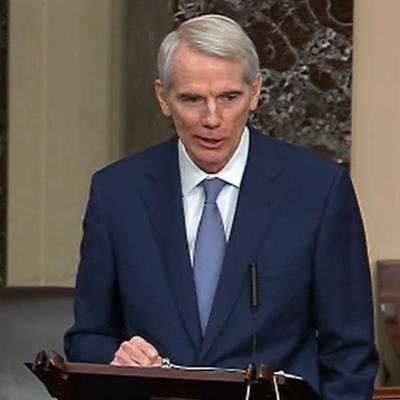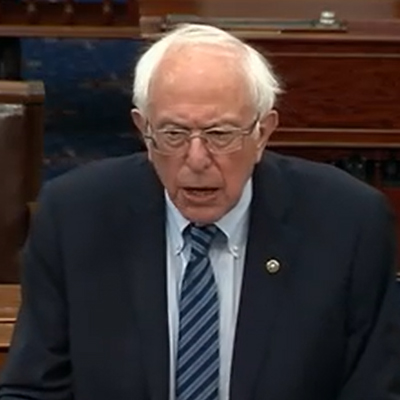
The Senate voted 69-30 on Tuesday to approve a $1.2 trillion infrastructure bill in a rare display of bipartisanship that dissolved quickly as Democrats then moved to approve a $3.5 trillion spending package by themselves.
Nineteen Republicans joined with all 50 members of the Democratic caucus in support of the infrastructure bill, which includes billions for grid improvements, alternative vehicles, existing nuclear plants and mining communities, in addition to widely supported spending on roads, bridges and ports.
The 2,702-page Bipartisan Infrastructure Investment and Jobs Act adds new spending of about $550 billion over fiscal years 2022-2026. (See Bipartisan Infrastructure Bill Offers Funding for Grid, EVs.)
Then early Wednesday, the Senate voted 50-49 to approve $3.5 trillion in climate and social welfare spending via the budget reconciliation process, which is not subject to the filibuster. House Speaker Nancy Pelosi (D-Calif.) had said she would not bring the bipartisan bill to a vote until the Senate approved the Democrats’ spending bill.

Before the vote on the bipartisan bill, senators were effusive in their praise of their staffs and their fellow senators across the aisle. Sen. Rob Portman (R-Ohio) thanked Sen. Kyrsten Sinema (D-Ariz.), with whom he began meeting more than four months ago to “lay the foundation for our path forward.”
“I commend her for her leadership, for her courage and for her ability to keep us on track during some tough times during this process,” Portman said.
He said almost three-quarters of the pages in the bill were from legislation previously passed in the Senate or its committees, calling it “a tribute to the quiet bipartisanship that goes on at the committee level.”
He also noted that more than 100 industry associations, unions and trade groups endorsed the legislation, including the Chamber of Commerce, the Business Roundtable and the National Association of Manufacturers from business, and the AFL-CIO and the Teamsters from labor.
Sen. Shelley Moore Capito (R-W.Va.), the ranking member of the Environment and Public Works Committee, thanked committee Chair Tom Carper (D-Del.), who she said steered committee approval of two infrastructure packages that formed “the foundation” of the bill. “He has been great in managing this bill on the floor but also [keeping] the guardrails on what we established to make sure that … the bipartisan group was following along with what the committee had unanimously passed.”
Majority Leader Chuck Schumer (D-N.Y.) also thanked the Republicans who signed on to what he called “the most robust injection of funds into infrastructure in decades.”
Then he quickly turned to the Democrats’ spending bill.
“The bipartisan infrastructure bill is a very significant bill, but our country has other very significant, very important challenges.” Schumer said. “So to my colleagues concerned that this does not do enough on climate, for families and for making corporations and the rich pay their fair share, we are moving on to a second track which will make generational transformation in these areas.”
Reaction
The Business Council for Sustainable Energy praised the passage of the bipartisan bill while also calling for approval of the Democrats’ budget measure, saying “policymakers should keep the findings of this week’s [U.N.] report top of mind.” (See Too Late to Stop Climate Change, UN Report Says.)
The American Council on Renewable Energy released a letter signed by 186 House Democrats endorsing long-term extensions and expansions to the production tax credit; an investment tax credit (ITC) to help meet President Biden’s target of a carbon-free power sector by 2035; modernization of tax incentives for commercial and residential energy efficiency and residential electrification; incentives for clean transportation and alternative fuel infrastructure; and a direct pay option to aid financing of energy projects whose sponsors can’t take advantage of tax credits.
On Wednesday, ACORE also released a letter from it and more than four dozen utilities, renewable energy companies, transmission developers, environmental organizations, and business and labor groups urging Congress to include an ITC for “regionally significant” transmission in the budget bill. The groups said the bipartisan bill “no longer addresses the interregional, interstate highway-type lines for which the current U.S. regulatory structure has no functioning means of cost recovery.”

“Even if the Federal Energy Regulatory Commission decides to act on its own authority in this area, that process has historically been time-consuming, characterized by significant uncertainty and subject to lengthy judicial review,” they continued. “A federal transmission ITC would give private capital the certainty it needs now to invest in the national, high-priority lines that will serve as the backbone for America’s clean energy grid.”
Edison Electric Institute President Tom Kuhn called the bill’s $7.5 billion for electric vehicle charging infrastructure and $7.5 billion for low- to zero-emissions buses and ferries “a good down payment on the electric vehicle charging infrastructure and low/no-emission buses that we need to accelerate the electrification of the transportation sector.”
The Bipartisan Policy Center (BPC) praised the bill for appropriating funding for demonstration projects authorized under the Energy Act of 2020, including energy storage, carbon capture, direct air capture, renewable energy and advanced nuclear reactors. The BPC also highlighted funding to aid the offshore wind industry and the Department of Transportation’s Port Infrastructure Development Program and Marine Highways Program.
The Carbon Capture Coalition joined the BPC in endorsing provisions to build out CO2 pipeline infrastructure through the SCALE Act and funding of carbon capture, utilization and storage.
The National Rural Electric Cooperative Association praised the bill’s support for public-private partnerships to improve physical and cybersecurity but called for additional assistance for rural communities.
“As policymakers plan for a future that depends on electricity as the primary energy source for much of the economy, more work will be needed to build on this infrastructure down payment,” NRECA CEO Jim Matheson said. “Electric co-ops will continue pushing for the financial flexibility to refinance existing government loans at today’s low interest rates and eligibility for direct pay tax credits to boost electric co-op investments in renewables and other innovative energy technologies.”
The Alliance to Save Energy highlighted $65 billion for grid modernization and $3.5 billion for the Weatherization Assistance Program.
Reconciliation Package
Schumer called for action on the reconciliation bill immediately after the vote on the bipartisan bill was tallied. His motion to begin debate was approved 50-49.

The debate over the bill began with Sen. Bernie Sanders (I-Vt.), chair of the Budget Committee, laying out his case for the additional spending.
“At a time when California is on fire, when Oregon is on fire, when Greece is burning and when countries throughout the world are experiencing unprecedented drought which will clearly impact food production, this legislation begins the process of combatting climate change so that our kids and grandchildren can live in a country and a planet which is healthy and habitable,” Sanders said. “It would be immoral and an absolute dereliction of our responsibilities as elected officials to do anything less. We cannot ignore climate change any longer. Now is the time for our great country to lead the world out of this existential crisis.”
Sen. Lindsey Graham (R-S.C.), the ranking member on the committee, responded by calling the bill a socialist Trojan horse that would result in increased gasoline and home heating costs and a flood of illegal immigrants.
“If you implement the provisions of this budget resolution regarding climate change, you’re declaring war on the internal combustion engine; you are going to shut down coal-fired plants,” he said. “I believe in climate change, and I’d like to have a rational approach to solving the problem, but this is not rational. … So yes sir, we’re going to have one hell of a fight.”
The reconciliation bill lays out a framework for the federal budget. Its details will not be determined until Congress enacts additional legislation to flesh out the outline. The House is expected to begin work on the legislation when it returns from its recess on Aug. 23.
It is expected to include $300 billion in clean energy spending, including additional funding for EVs in support of Biden’s Aug. 5 executive order calling for 50% of cars sold in 2030 to be electric or hybrid. (See Biden Executive Order Sets 50% EV Goal by 2030.)
ClearView Energy Partners told its clients Friday the reconciliation legislation could provide more than $100 billion for EV manufacturing and purchase incentives plus another $100 billion for solar, wind and advanced manufacturing.
A White House fact sheet issued Friday highlighted the administration’s “Build Back Better” priorities beyond the bipartisan deal, calling for extending and expanding clean energy and EV tax credits.
It also listed creation of an energy efficiency and clean electricity standard and a Civilian Climate Corps to work on conserving public lands and waters and improving community resilience.
Votes on Amendments
Members then worked into Wednesday morning with voting on amendments to the reconciliation, beginning with a 99-0 vote in favor of one by Sen. John Barrasso (R-Wyo.) that would prohibit “legislation or regulations to implement the Green New Deal.”
Sanders said he could support it because “it has nothing to do with the Green New Deal.”
“Despite what Sen. Barrasso says, the Green New Deal would not shift jobs overseas. In fact, it will create millions of good-paying jobs in the United States of America. It will not raise electricity prices. It will not make the U.S. dependent on dirty sources of energy from other countries.”
Many other votes were along party lines, with Democrats backing one by Sen. Carper to create a reserve fund “relating to addressing the crisis of climate change” and rejecting Republican amendments to block stepped up tax enforcement and cancel the Biden administration’s ban on new oil and gas leases on federal land.
In all, the Senate considered 41 amendments on issues including abortion, immigration, police hiring and taxes before approving the reconciliation about 4 a.m. with no Republican support. One Republican, Sen. Mike Rounds (S.D.), did not vote.
Energy amendments approved included a fund for “preventing electricity blackouts and improving electricity reliability” (52-47) and a means test to prevent high-income individuals from getting subsidies for luxury EVs (51-48).
Also approved were amendments:
- prohibiting federal funding for renewable energy projects using materials, technology and critical minerals from China (90-9);
- barring the Council on Environmental Quality and EPA from promulgating rules or guidance banning hydraulic fracturing (57-42);
- preventing the Department of Agriculture from making fossil fuel generation ineligible for financing (53-46); and
- prohibiting or limiting the issuance of “costly” Clean Air Act permit requirements on farmers and ranchers or the imposition of new federal methane regulations on livestock (66-33).
Following the votes, Schumer said the Democrats’ budget “will bring a generational transformation for how our economy works for average Americans.”
Progressives are likely to face opposition on some spending from Sens. Sinema and Joe Manchin (D-W.Va.), the latter the chair of the Energy and Natural Resources Committee, who have both expressed opposition to the $3.5 trillion price tag. With Republicans united in opposition, Democrats can’t afford to lose a single vote on the final spending package.



